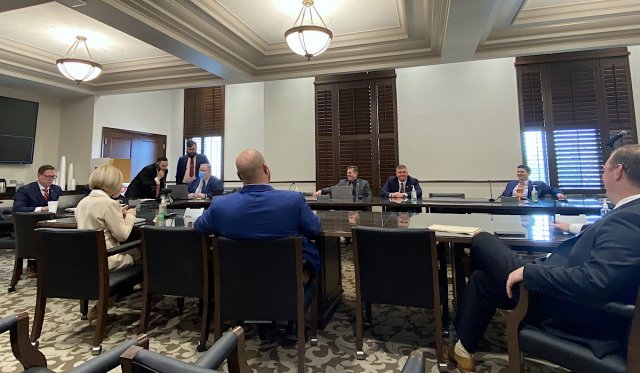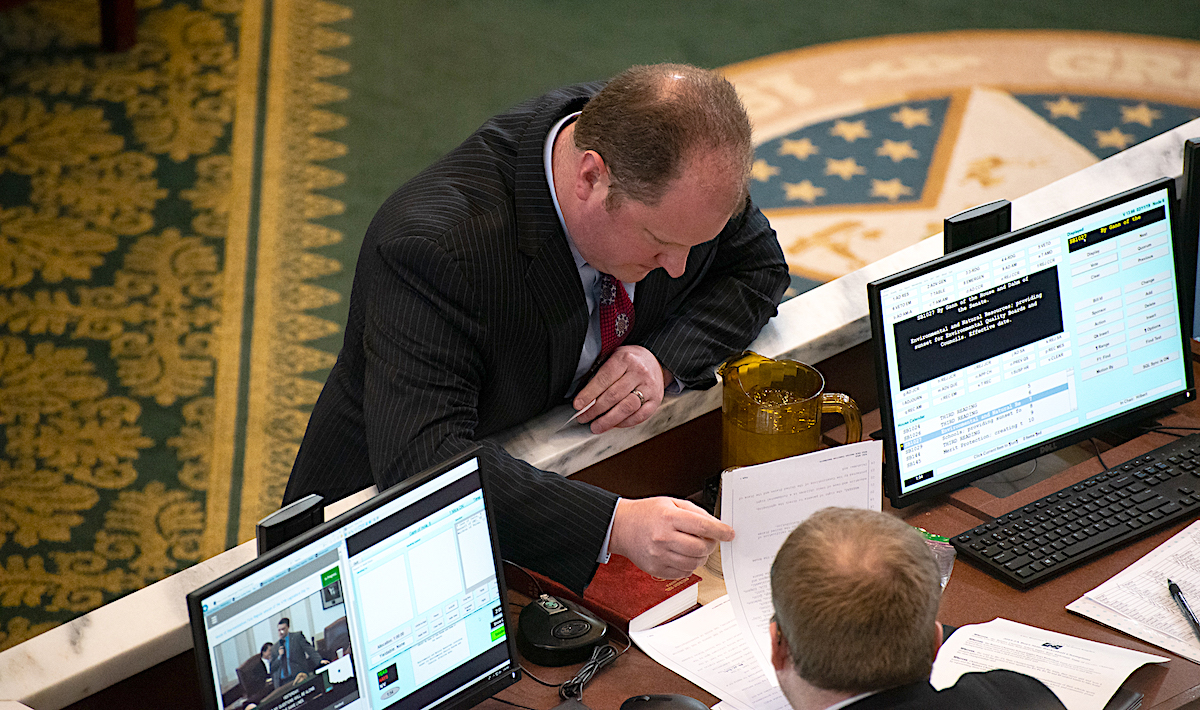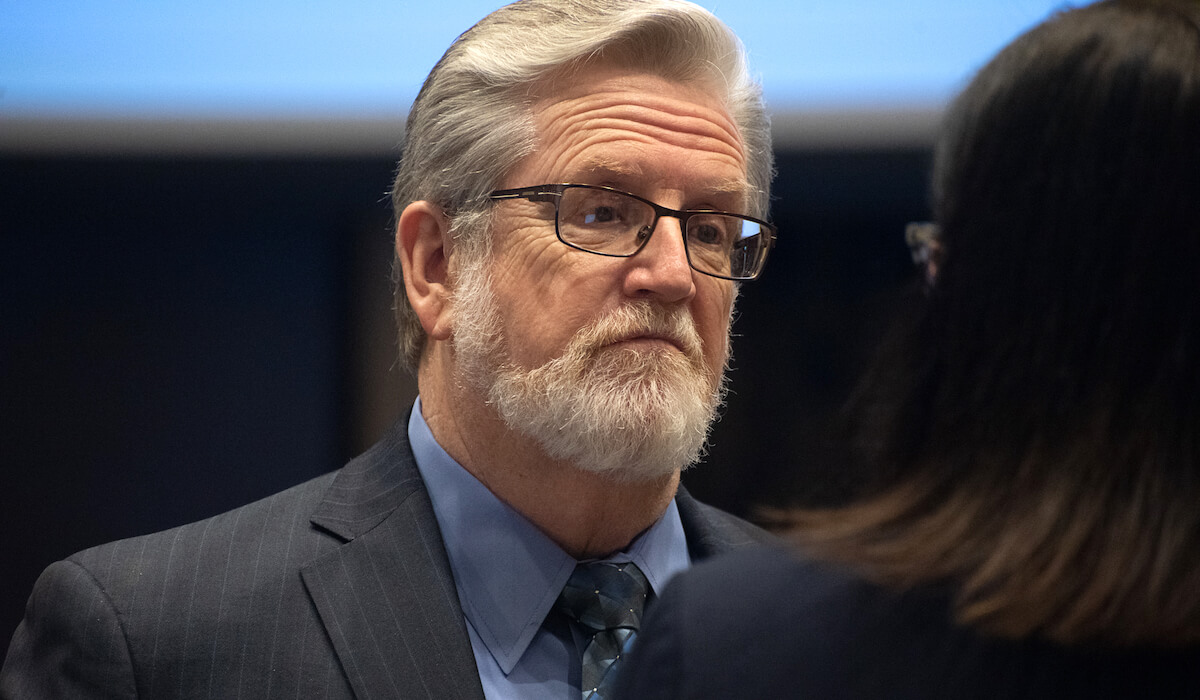

Considering the old saying that it’s always darkest before the dawn, the sun might be rising soon at the Oklahoma Legislature, where the House and Senate are slowly playing out their budget and policy disagreements in public — if you know where to look.
The House Rules Committee held a three-minute, unusual meeting today immediately after the House GOP Caucus had gathered in private at noon. During the meeting, the Rules Committee revealed and advanced HR 1026 to create a special rule “for purposes of addressing states’ rights and constitutional issues” in three new bills: HB 1237, HB 1238 and HB 1239.
After contentious questioning and debate, the House floor passed HR 1026 by a 72-20 vote allowing HB 1237, HB 1238 and HB 1239 to be considered under a different set of rules that will limit debate and motions on the measures. (HB 1237 came up for House consideration immediately after the HR 1026 vote.)
“What are we doing here? What are we doing?” asked Rep. Forrest Bennett (D-OKC) during debate on HR 1026. “We spend so much of our time dilly-dallying. This inner-rotunda fight is not what the people of Oklahoma deserve.”
Understanding the fight referenced by Bennett is complicated. Since last week, House and Senate leadership have been feuding over the language of HB 1236, a proposal from House Speaker Charles McCall (R-Atoka) to create a mechanism for Oklahoma to push back against potential federal executive orders on issues like gun laws, oil and gas exploration and transgender athletes.
The language in HB 1236 had already changed multiple times before Senate President Pro Tempore Greg Treat (R-OKC) dropped his own version Monday afternoon, which passed the full Senate 33-14 early Tuesday. Treat’s version proposed a “State Reserved Powers Protection Unit” in the Oklahoma Attorney General’s Office, and it provided $10 million in funding for the unit as an apportionment from corporate income tax revenues.
Earlier this session, McCall and House Republicans had sent the Senate a bill to phase out Oklahoma’s corporate income tax over a five-year period. Treat announced April 8 that “there is not an appetite to do the corporate income tax cut in the Oklahoma State Senate.”
Treat took to Twitter on Monday to explain his opposition to the House’s version of HB 1236, while touting his version as one that would pass constitutional muster.
“As originally written, HB 1236 gives people false hope because it is an unconstitutional nullification bill that clearly violates separation of powers,” Treat said. “That is why I had concerns about it. Nullification is a failed legal theory that southern states used to justify slavery during the Civil War. Nullification undermines the tenets of our republic.”
House Republican leaders disagree.
“I appreciate Pro Tem Treat attempting to work on the bill, but I think after working in our caucus, the opinion of the caucus is that the bill in its current form as amended is way too weak,” said House Majority Floor Leader Jon Echols (R-OKC). “But I appreciate the pro tem being willing to work on the bill.”
Echols et al will give Treat and his caucus more work on the topic by sending HB 1237 (and perhaps subsequently HB 1238 and HB 1239) — which all could feature the House’s original HB 1236 language — across the rotunda this week.
“We would essentially be sending four versions of the same bill over to the Senate,” House Minority Leader Emily Virgin (D-Norman) said during floor discussion of HR 1026. “Why would we do that?”
Rep. Mike Osburn (R-Edmond) offered a blunt admission.
“To be honest, I don’t know the answer to your question, necessarily,” Osburn said. “But this is something that is within the purview of the House to do, and we have chosen to do that at this point.”
House Speaker Pro Tempore Terry O’Donnell (R-Catoosa) presented HB 1237 on the floor Tuesday afternoon, emphasizing its reliance on “judicial review” instead of Treat’s version of HB 1236, which removed that component.
HB 1237 would allow the Legislature to ask the attorney general to consider whether a federal order or law deserves to be challenge. Were the attorney general not to pursue that challenge, the Legislature would again be allowed to vote on whether to hire legal counsel to pursue such a challenge.
HB 1237 does not include a funding mechanism like Treat’s version did. It advanced from the House by a 79-18 vote.
Film rebate program a point of contention

As the House and Senate work through their disagreement on the federal pushback proposal, they are also at odds over SB 608‘s proposed increase to the Oklahoma film rebate program. The House filed an amendment Monday afternoon that reimagined the program, contained a $50 million cap and appeared to be an agreement between the House and Senate on the matter.
Then, House Appropriations and Budget Chairman Kevin Wallace (R-Wellston) filed an amendment Tuesday morning dropping the cap to $20 million.
Roger Thompson (R-Okemha) said he was not pleased by the sudden change.
“We had worked with the House and their designee of Rep. (Scott) Fetgatter and, of course, Sen. (Chuck) Hall was our designee,” Thompson said. “We’d worked with the industry. We had even met as early as yesterday afternoon, and we had talked about the language being dropped, and what was dropped was the $50 million cap. It’s a working incentive, it’s good for Oklahoma. It takes care of our problems. I have no idea why he filed an amendment this morning dropping it to $20 million.”
While Thompson emphasized the economic benefit of encouraging film production in Oklahoma, Echols said House Republicans see those numbers and have a different thought.
“The citizens of the state of Oklahoma deserve tax relief if we are going to give $50 million to Hollywood,” Echols said. “We sent over numerous tax relief bills, and if we are going to give $50 million to Hollywood — which I’m not necessarily saying I’m opposed to, by the way — but if we have $50 million to give to Hollywood, the citizens of Oklahoma deserve some tax relief.”
Thompson disagreed with the characterization.
“The amount of jobs it is creating for Oklahoma — and we keep talking about diversifying our economy — this is an Oklahoma film plan that is only going to give them two years to ramp up and have a workforce in Oklahoma to take care of it,” Thompson said. “And after that, it’s got to be Oklahomans who are educated and ready to lead forward. It has a sunset on the bill, and I think it’s a great thing.”
Asked if the second amendment dropping the program cap from $50 million to $20 million is a step backward in budget negotiations, Thompson said, “Not really.”
“We’re at that time of year where we’ve got all the small stuff done, so now we’re talking about those things that are important to the House and those things that are important to us,” he said.
More budget discussion details revealed

As the Senate’s chief budget negotiator, Thompson has previously explained the House and Senate GOP disagreement over how much to increase the common education budget. Asked Tuesday whether the House had moved toward his position on the matter, Thompson said, “Not yet.”
“And I have not come to theirs,” Thompson said.
He then revealed additional details about budget discussions.
“I’m really excited about what we’re doing with OSU in Tulsa, and the Senate is also carrying a behavioral health (plan) for children at OU,” Thompson said. “For our young people who need behavioral health, we need beds. The House has made that a political point. I don’t think that’s politics at all. I think we’ve got the mental health of our children in the state at stake, and the Senate is firm we want that done.”
Thompson said the OU behavioral health proposal would cost $9.9 million annually for three years and would allow for two floors in the OUHSC Garrison Tower to be renovated for additional pediatric behavioral health care.
“They can operate [the program] themselves,” he said. “They have the operating budget. I think coming out of the pandemic, it’s very important.”




















